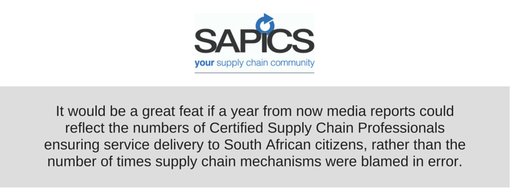 By Mungo Park, President of SAPICS At the beginning of every new year, it is customary to give an opinion of the trends that are emerging or that are likely to develop further during the course of that year. Supply chain management is no different, as the discipline is constantly evolving in the quest for ever improving service levels through increased efficiency and effectiveness. Some of the current technology trends attracting a lot of international interest, such as increased automation and robotics, self-driving vehicles and drone deliveries, as well as 3D printing certainly remain long term trends, but not necessarily for 2017. Supply chain trends will continue to be driven by the need to support business in meeting customer expectations while continuing to better manage and control costs. As a result, priorities for supply chain executives this year will include: Supply chain analytics The use of supply chain analytics and business intelligence will increase as organisations work to improve control and visibility of the extended supply chain. Awareness of the supply chain as a strategic business lever will also continue to grow, while supply chain event management and measurement will provide the fulcrum. Furthermore, accurate reporting and the ability to analyse reports will enable business to identify poor performing partners, highlight inefficiencies and weak links in the chain, identify opportunities for efficiency improvement, increase collaboration, as well as better supply chain cost management. Ongoing eCommerce challenges The rate of growth of online retail versus bricks and mortar retail is set to continue. This will put pressure on businesses to meet the ever increasing expectation of online shoppers for prompt, on-time delivery of purchases. Couriers and distribution service providers will be expected to be more efficient while under pressure to be cost competitive. As the eCommerce side of a business grows, more sophisticated warehousing solutions will be required to meet the accuracy and timelines demanded by an online business. This could lead to the outsourcing of eCommerce warehousing to specialist service providers. Supplier/partner integration will be a key success factor, as will accurate tracking and delivery status communication to the customer. Technology and automation While significant advances are being made in the use of technology to facilitate supply chain efficiency, in South Africa there is the additional challenge of balancing the level of automation with labour. Augmented reality, can provide improvements in accuracy and efficiency in picking and load planning, as well as packing, but can also be a useful tool to support and train less skilled logistics staff. It will be important to invest wisely in technology to ensure a good return. Skills and resources An independent report found that 45% of South African supply chain managers believe they do not have the skills to do their job properly. Further research also suggests that those who do possess strong quantitative abilities often lack equally important interpersonal and leadership skills. Finding and retaining skilled supply chain staff as well as managers will continue to be challenging. Organisations will need to invest in training at all levels to develop the skills necessary to ensure the sustainability of their supply chains. Increased SCM risk and disruption As supply chains extend and reliance on global suppliers and partners increases, supply chain risk and disruption can be expected to continue. Rationalisation of suppliers and improved collaboration with preferred suppliers can help mitigate risk, but it is important to identify alternative sources of supply for products, critical components and materials. Therefore, contingency plans should be put in place to enable quick response to unanticipated disruption and ensure business continuity. It is further important to build resilience and predictability into a supply chain to avoid being the cause of your own disruption. Supply chain planning, visibility and measurement continue to be key disciplines critical to minimise unnecessary disruption, while collaborative partnerships with reputable, well established logistics service providers will also make your supply chains more resilient. It’s good to look forward to an exciting year that won’t be without it’s challenges, but that will also be full of opportunity. I believe that the supply chain is one of the primary keys to the success of an organisation and that if it is robust it will continue to provide a platform for strategic competitive advantage. This article originally appeared in Bizcommunity’s 2017 BizTrends feature http://www.bizcommunity.com/Article/196/729/156078.html ENDS MEDIA CONTACT: Idéle Prinsloo, 082 573 9219, [email protected], www.atthatpoint.co.za ABOUT SAPICS – your supply chain community SAPICS is a professional knowledge-based association that enables individuals and organisations to improve business performance. SAPICS builds operations management excellence in individuals and enterprises through superior education and training, internationally recognised certifications, comprehensive resources and a countrywide network of accomplished industry professionals. This network is ever expanding and now includes associates in other African countries. For more information on SAPICS please visit: Website: www.sapics.org.za Twitter: @SAPICS01 LinkedIn: SAPICS group Facebook: OperationsManagement ABOUT APICS SAPICS is a proud APICS' exclusive Premier Channel Partner for Sub Saharan Africa. APICS is the leading professional association for supply chain and operations management and the premier provider of research, education and certification programs that elevate end-to-end supply chain excellence, innovation and resilience. APICS Certified in Production and Inventory Management (CPIM), APICS Certified Supply Chain Professional (CSCP) and the brand new APICS Certified in Logistics, Distribution and Transport (CLTD) designations set the industry standard. With over 37,000 members and more than 250 international partners, APICS is transforming the way people do business, drive growth and reach global customers. APICS is based in the USA and has a broad global footprint. www.apics.org
0 Comments
 A different set of professional qualifications is needed in response to the changes in the global marketplace. The traditional MBA is challenged by the need for more practical oversight and management of a variety of business areas. “As organisational structures advance and evolve, new and often challenging talent requirements arise,” explained Abe Eshkenazi, CEO of APICS (USA) at the recent 38th Annual SAPICS Conference for supply chain professionals. “We need to ensure that we have the right competencies needed to achieve organisational goals.” Move supply chain management from the back office to the boardroom Supply Chain Management (SCM) should be a strategic imperative in every organisation. It is a critical differentiator; no longer a function relegated to the back office. Supply chains are becoming part of the corporate business model – as important to finance and marketing as to production. Because of global and local transparency trends, customers and suppliers are playing a more active role at every stage. SCM therefore needs strategic, functional, and operational efficiencies to be effective. “To achieve this we need to identify, train and retain talented staff which will allow us to gain competitive advantage,” said Eshkenazi. Invest in SCM people during tough economic times For supply chain management to have a critical and positive impact on the bottom line it is necessary to develop and educate people to enable them to operate great supply chains. “Don’t let talent development and professionalisation slip due to tough economic conditions,” warns Eshkenazi. “In supply chain management your number one asset is people as successful supply chains are based on individual successes.” Employees will stay with companies that are concerned with and invest in their professional development. Once tough economic times turn around again, the companies with the best workforce will gain field quicker than those that didn’t develop their talent pool during the tough times. What many find surprising is the wide variety of knowledge and skills supply chain professionals need to have; technical expertise alone is no longer enough. Compliment technical skills with technology skills While supply chain subject matter experts still must have solid technical expertise, they also need other skills and experience to close the gaps created by the changed marketplace. Technological advances in supply chain management have increased the speed of change, and individuals must be able to understand and use the technology instead of shying away from it. This adds another level of complexity to the training required to ensure competitive supply chain management. “Supply chain managers also need global business leadership skills to enable them to understand and negotiate supply chain elements irrespective of the location,” said Eshkenazi. “Problem-solving, international work exposure, and cross functional management skills are also of great importance.” Make careers in supply chain management as desired as those in executive management Eshkenazi identified a lack of knowledge of supply chain management as a lucrative and satisfying career as one of the areas hindering supply chains as strategic imperative. “We need to have people coming to educational institutions looking for a career in supply chain,” said Eshkenazi. “This is part of the focus areas for organisations such as APICS and SAPICS.” SAPICS is the exclusive Premier Channel Partner for Sub Saharan Africa of APICS, a provider of research, education and certification programs that elevate supply chain excellence, innovation and resilience. Certified supply chain professionals will be able to makes significant contributions towards the sustainability and success of their employers. Certifications as Supply Chain Professional (CSCP), Supply Chain Operations Reference Professional (SCOR-P), and in Production and Inventory Management (CPIM), and Logistics, Transportation and Distribution (CLTD) are currently available. Eshkenazi reminded the audience: “The development of individuals is not an option, it’s an imperative.” PHOTO CAPTION: Abe Eshkenazi encourages employers to consider supply chain certifications as an important part of skills development. ENDS MEDIA CONTACT: Idéle Prinsloo, 082 573 9219, [email protected], www.atthatpoint.co.za ABOUT SAPICS – your supply chain community SAPICS is a professional knowledge-based association that enables individuals and organisations to improve business performance. SAPICS builds operations management excellence in individuals and enterprises through superior education and training, internationally recognised certifications, comprehensive resources and a countrywide network of accomplished industry professionals. This network is ever expanding and now includes associates in other African countries. For more information on SAPICS please visit: Website: www.sapics.org.za Twitter: @SAPICS01 LinkedIn: SAPICS group Facebook: OperationsManagement ABOUT APICS SAPICS is a proud APICS' exclusive Premier Channel Partner for Sub Saharan Africa. APICS is the leading professional association for supply chain and operations management and the premier provider of research, education and certification programs that elevate end-to-end supply chain excellence, innovation and resilience. APICS Certified in Production and Inventory Management (CPIM) and APICS Certified Supply Chain Professional (CSCP) designations set the industry standard. With over 37,000 members and more than 250 international partners, APICS is transforming the way people do business, drive growth and reach global customers. APICS is based in the USA and has a broad global footprint. www.apics.org  Marilize Worst challenged supply chain professionals at the SAPICS conference to work towards zero waste to landfill Marilize Worst challenged supply chain professionals at the SAPICS conference to work towards zero waste to landfill Change is needed throughout entire product lifecycle In South Africa we produce R25.2 billion worth of waste annually – 90% of landfills are composed of avoidable waste. There is growing pressure on companies to understand the true value of waste instead of relegating the problem to the SHEQ or finance team. “Forward thinking businesses are starting to see waste management as a value-add to the bottom line,” said Marilize Worst, Managing Director from SmartMatta, at the recent 38th Annual SAPICS Conference for supply chain professionals. “It is no longer enough to just consider waste management merely as a cost saving exercise.” Think of waste as money down the drain The typical waste hierarchy is first reduce, then reuse, then recycle. Making a real difference however requires recreating a current supply chain as a continuous positive development cycle. “This optimisation of value throughout the life cycle of products is often referred to as a closed loop approach,” explained Worst. “The cycle should preserve and enhance natural capital, optimise resources, and minimise system risks.” Modern consumers, when presented with two brands they like, will choose the one that is better for the environment. Recyclable packaging has already proven popular. Knowledge of the way carbon emissions were saved – and waste to landfill reduced – during the processing and transportation phases of a product could follow the same route to influence buyer decisions. Find the value in waste “Currently the consumption pattern of products is linear,” said Worst. “We take materials out of the ground, create a product, we then throw the waste away, although we do attempt to recycle some of it.” “There’s nothing wrong with waste; it depends on how you manage it. The aim isn’t zero waste, but zero waste to landfill. The concept of circular economy is that we leave nothing behind.” A circular economy is also financially valuable. The benefits to those companies participating in a circular economy include competitiveness, brand protection and customer loyalty, material/energy recovery, better supplier relationships, and ecological, health and social benefits. Approach waste management from a systems perspective To effectively develop a waste management strategy, a baseline of data and resources that represents the current situation should be created. From there, a waste management strategy based on this baseline should be developed, obtaining input from all functional areas in the business. Communication and feedback into the strategy should be allowed to make sure the plan is not just determined at the boardroom table, but aligns with the way a business actually operates. The plan must be reassessed and realigned every time major operational changes are made. “Case studies have shown that changes in procurement strategies can reduce waste to landfill to almost zero,” said Worst. “The wider supply chain function should also focus on reducing waste generated within complex supply chains.” The areas of improvement in supply chains include creating economies of scale by maximising recovery and restoring value, analysing and reducing energy consumption and carbon emissions, and finding synergies between the generators and potential users of waste. Further improvements can be made by improving package design and selecting less harmful materials, reduce carbon footprint by optimising transport to and from distribution centres, and also by optimising repacking or refurbishing of product returns. “Reducing waste has to be a strategic priority for every business,” warned Worst. “What we have is all we have; there is no backup earth, no hidden resources, no added extras.” Marilize Worst will be a speaker at the regional SAPICS conferences for supply chain professionals in August. More information is available at http://www.sapics.org/events/sapics-regional-conferences/ ENDS MEDIA CONTACT: Idéle Prinsloo, 082 573 9219, [email protected], www.atthatpoint.co.za ABOUT SAPICS – your supply chain community SAPICS is a professional knowledge-based association that enables individuals and organisations to improve business performance. SAPICS builds operations management excellence in individuals and enterprises through superior education and training, internationally recognised certifications, comprehensive resources and a countrywide network of accomplished industry professionals. This network is ever expanding and now includes associates in other African countries. For more information on SAPICS please visit: Website: www.sapics.org.za Twitter: @SAPICS01 LinkedIn: SAPICS group Facebook: OperationsManagement ABOUT APICS SAPICS is a proud APICS' exclusive Premier Channel Partner for Sub Saharan Africa. APICS is the leading professional association for supply chain and operations management and the premier provider of research, education and certification programs that elevate end-to-end supply chain excellence, innovation and resilience. APICS Certified in Production and Inventory Management (CPIM) and APICS Certified Supply Chain Professional (CSCP) designations set the industry standard. With over 37,000 members and more than 250 international partners, APICS is transforming the way people do business, drive growth and reach global customers. APICS is based in the USA and has a broad global footprint. www.apics.org Many South African manufacturers’ efforts to expand into Africa have failed. Two mistakes – according to speakers on the line-up for the 2016 SAPICS conference for supply chain professionals – are applying familiar product-focused processes, and discounting the importance of working within the existing framework of local culture.
Think distribution first, manufacturing second “Focusing too much capital expenditure on the production and manufacturing side without enough investment in the outbound supply chain – warehousing and distribution – is probably the single biggest mistake that South African companies make when expanding into Africa,” says Carsten Schubert, Director (East Africa) at Transnova Africa. “South African businesses readily accept the status quo of logistics systems and processes already in place in the country targeted for expansion, rather than challenging them and looking for more efficient ways of getting the product to market,” says Schubert. It is a dangerous practice to decide to make do with existing warehousing facilities and distribution processes if they are not suited to requirements for expansions into that particular territory. Another related mistake is abdicating control of the internal supply chain to distributors, with too much reliance placed on the local distributor’s network. “It is important to have visibility and control over your end to end supply chain,” warns Schubert. “Interacting directly and managing the relationship with your new customer base when you are trying to establish a foothold in a new market is a key success factor.” Productive interaction with a new environment relies strongly on working to understand local culture and their capabilities, and respecting the historic lessons that inform existing processes. Become immersed in the new culture “Every step of a new process needed to be designed through the eyes of the local workforce and their capabilities,” advises Bryan Baylis, Associate Director of Supply Chain with US-based Merck & Co Inc. “When local supply chain owners completely understand the proposed solutions, only then can your team execute a sustainable process, which can successfully meet the needs of the organisation today and well into the future.” Baylis explains that, as an outsider in a new environment, success is realised through complete immersion of oneself into the local culture, clearly understanding any existing processes, and working together as a cohesive team to provide viable solutions. “While new environments present unique challenges when designing supply chain systems, there is a common need to create a flexible system that can quickly adjust to today’s global environment,” says Baylis. The key to the success of an expansion project seems to be dependent upon keeping solutions smart enough to be effective, but simple enough to be sustainable in the local environment. Carsten Schubert and Bryan Baylis will present their unique supply chain insights at the 38th Annual SAPICS conference and exhibition for supply chain professionals in Sun City from 12 to 14 June 2016. More information is available at conference.sapics.org  Different to the tourism or marketing environments where digital integration has been absorbed organically, supply chain and manufacturing professionals have been sluggish to phase out what is a deeply entrenched traditional mentality. Thinking must change Prominent supply chain analyst and founder of Supply Chain Insight, Lora Cecere, believes that supply chain professionals have defined their processes as linear and inflexible; trusting enterprise resource planning (ERP) and advance planning and scheduling (APS) to optimise production and distribution processes. “To become digital, we need to define processes from the customer’s customer to the supplier’s supplier and use new technologies to listen, sense, and adapt,” explains Cecere. “This is not the platform of traditional technologies and the belief structures of traditional supply chain leaders. This is an opportunity for Africa. Consider the adoption of mobile phones, alternative payment structures and collaborative sharing in economies such as in Nigeria. It’s time that we question the status quo and traditional principles.” Cecere will in June join Flatiron Strategies’ Senior Industry Analyst, Peter Vanderminden; and Oracle’s digital supply chain expert, Maha Muzumdar; to speak at the 38th Annual SAPICS Conference and Exhibition for supply chain professionals, to be held at Sun City, 12-14 June 2016. The trio, while encouraging organisations to pursue a digital supply chain, accepts that this progression isn’t without flaws that businesses must take cognisance of. Big data, big concerns While the emerging IoT (Internet of Things) delivers huge dividends, it also presents potential data security risks for manufacturers as numerous corporate assets and end products will be linked via networks to provide a steady flow of real time data. As data volumes and Internet connectivity grow in the supply chain and on the manufacturing floor, there is increased risk of data security being compromised, cautions Maha Muzumdar, Vice President of Industry Transformation, Oracle Cloud Business Group. “Manufacturers today need to be more vigilant of intellectual property and trade secret violations and potential corporate espionage,” adds Muzumdar. “Today there are new security issues for companies to deal with as automation and data volumes increase. Data security needs to be addressed at multiple levels - the enterprise level, the shop floor level and at the user device level. Companies need a comprehensive portfolio of security strategies such as identity management, access management and mobile security to ensure data privacy, protect against internal and external threats, and enable regulatory compliance.” While IoT devices – such as digital sensors – forgo the need for manual input of data, thus achieving greater accuracy, businesses must also be able to use this new flood of data effectively. This, too, can present a problem, explains Peter Vanderminden, Senior Industry Analyst at Flatiron Strategies “This does result in a flood of ‘big data’ which organisations may not have the capability to analyse and use effectively. That is where the breakdown often happens. As you implement IoT capabilities into your products, making them digital, it’s all about how we bring both these worlds together – converging IoT operational with traditional SCM IT and bringing the physical and digital supply chain together,” he says. For more information on #SAPICS2016, or to register, visit conference.sapics.org ENDS MEDIA CONTACT: Juanita Vorster, juanita@thatpoint.co.za, www.atthatpoint.co.za For more information on SAPICS please visit: Website: www.sapics.org.za Twitter: @SAPICS01 LinkedIn: SAPICS group Facebook: OperationsManagement The supply chain management community of South Africa wants to highlight another critical error made in shifting the blame of the Nkandla scandal to supply chain mechanisms: the correct terminology to use would have been public procurement mechanisms.
The term supply chain describes far more than just procurement. This very specialised profession encompasses all activities needed to deliver the right product or service to the right customer, at the right time, place, and cost. Supply chain management theory delves deep into the efficiencies of sourcing, processing, manufacturing, transporting, storing, distributing, tracking, and returning anything from raw metals to household products sold in retail stores. References to supply chain problems in the public sector as catchall term for public procurement policies that lead to fruitless and wasteful expenditure are not only inaccurate, but dangerous, as it shifts the focus away from the true problem at hand. It is also an insult to highly qualified professionals that ensure on a daily basis that South African consumers have easy access to a wide variety of local and imported products and services that make their lives possible and enjoyable. Managing a supply chain demands an understanding of an entire value chain; all the suppliers that work seamlessly together to ensure that doctors have the necessary machinery to perform life-saving operations, that enjoying fresh seafood is possible even thousands of kilometers away from the sea, and that your online shopping order arrives at a time and place convenient for you. The Western Cape province is an example of public sector organisations that have a solid grasp of the true meaning of supply chain. The proof is evident in an increase in clean audits, exceptional delivery of basic services to its citizens, and a number of other statistics that show that local government can serve with excellence its constituents within the framework of the Public Financial Management Act (PFMA) that set out public procurement – referred to as supply chain – processes. While it can be argued that the matter at hand is one of semantics, something as small as a change in understanding that there is more to supply chain – and content citizens as a results – than just procuring goods and services within a legislative framework. The next step would be to ensure that all civil servant employed in a supply chain capacity are well trained in the theory of comprehensive supply chain management. It would be a great feat if a year from now media reports could reflect the numbers of Certified Supply Chain Professionals ensuring service delivery to South African citizens, rather than the number of times supply chain mechanisms were blamed in error. ENDS Issued by: SAPICS - your supply chain community MEDIA CONTACT: Juanita Vorster, juanita@thatpoint.co.za, www.atthatpoint.co.za For more information on SAPICS please visit: Website: www.sapics.org.za Twitter: @SAPICS01 LinkedIn: SAPICS group Facebook: OperationsManagement  Ralton Moses, Divisional Director of Operations at UTi Pharma and speaker at the upcoming SAPICS Conference Ralton Moses, Divisional Director of Operations at UTi Pharma and speaker at the upcoming SAPICS Conference A broader look at energy use in South Africa’s manufacturing sector and related supply chains – which saps a quarter of global energy annually – could lift businesses away from fiscal watershed. Even though new levies and rising tariffs peck at what little fat remains of business resources, cost-cutting options related to energy use are far from exhausted. Producing energy efficient buildings and operations, and replicating the supply chain structures, holds enormous potential. Ralton Moses, Divisional Director of Operations at UTi Pharma and speaker at the upcoming SAPICS Conference for supply chain professionals, explains that while warehousing has remained largely static with operations being somewhat consistent in South Africa over the last two decades, the associated costs are a different story altogether now. “For most major corporates, the socially responsible aspect of going green can no longer stand in isolation or be ignored and/or avoided; it needs to be aligned with the profitability strategy of the organisation in order to provide the required benefits to all stakeholders,” warns Moses. “Organisations should address the impact of carbon on their supply chain, as a significant percentage of a product’s value is derived from it. When a consumer purchases a product they are also buying the supply chain that delivers that particular service,” says Moses. “Increased labour costs also add inflationary pressure to operations and continually forces companies operating warehouses to reduce their carbon footprint in order to not only take care of our planet, but also to cut costs,” says Moses. “Organisations can significantly reduce their running costs through technology that measures and mitigates carbon dioxide.” In building their new state of the art green facility in Meadowview Gauteng, UTi Pharma managed to consolidate eight of its nine operations into one. The healthcare distribution r giant delivers around half of South Africa’s temperature-sensitive pharmaceutical products in the private market and had to incur significant expenditure on energy to monitor, control and regulate the temperatures of its storage and distribution facilities. The new facility’s has an annual energy demand of 60% of that of the preceding facility. Turning the lights off during weekends is no longer enough; an energy conscious strategy should incorporate everything from motion sensors and zoning systems for lighting, to grey water harvesting techniques and thermal storage systems. A key point identified by Moses as a less cost intensive solution is that businesses should select the most accessible, well-connected facility possible, one that’s optimally located in terms of the organisation’s demand and supply base. Transportation contributes more to a company’s energy footprint than warehousing, which means the choice of venue has a significant impact. Ralton Moses will describe in more detail the UTi Pharma hub’s green credentials and process followed at the 38th Annual SAPICS Conference and Exhibition for supply chain professionals, to be held at Sun City, 12-14 June 2016. For more information, or to register, visit conference.sapics.org ENDS MEDIA CONTACT: Cathlen Fourie, 012 644 2833, [email protected], www.atthatpoint.co.za For more information on SAPICS please visit: Website: www.sapics.org.za Twitter: @SAPICS01 LinkedIn: SAPICS group Facebook: OperationsManagement  Jenny Froome, General Manager at SAPICS Jenny Froome, General Manager at SAPICS Syspro, Barloworld Logistics, and Bidvest Panalpina Logistics have all signed up to celebrate the 50th birthday of SAPICS, the community for supply chain professionals in southern Africa. The celebrations will reach a high point at the 38th Annual SAPICS Conference & Exhibition, where conference delegates will have the opportunity to listen to prominent industry experts including André de Ruyter, CEO of Nampak, Lungelo Khumalo from SABMiller Africa, and Bryan Baylis from Merck. The conference will be held 12-14 June 2016 at the brand new Sun Sky Village at Sun City. The programme will include multiple streams focusing on specific areas of the supply chain including expansion into Africa, warehousing, logistics, big data, software etc. Local conferences that feature international speakers are still one of the best ways to receive international best practice updates without the time and expense incurred by attending international events. The mix between international and local speakers that will be present during the 2016 SAPICS conference will allow delegates to learn how to overcome similar challenges faced by their own supply chain management concerns. More information is available at conference.sapics.org ENDS MEDIA CONTACT: Cathlen Fourie, 012 644 2833, [email protected], www.atthatpoint.co.za For more information on SAPICS please visit: Website: www.sapics.org.za Twitter: @SAPICS01 LinkedIn: SAPICS group Facebook: OperationsManagement  Lungelo Khumalo Lungelo Khumalo Millennials have swept the world of work, bringing their own attitudes and beliefs about the workplace. Their difference in approach could be very important in the survival of increasingly complex supply chains that demand efficient responses to challenges. Organisations have up to four generations represented at any time, bringing with it potential conflicts. Given that millennials will account for 50% of organisations’ workforces, understanding this generation will be pivotal in unlocking competitive advantage and achieving harmony in the workplace. Competitive advantage no longer lies in having the better widget, it now lies in having the best people who can co-ordinate resources, solve problems and respond to today's challenges in innovative ways. Lungelo Khumalo, a proud supply chain millenial, will at the upcoming SAPICS conference for supply chain professionals provide a deeper understanding of what makes millennials tick. Khumalo will also share research and practical approaches from senior local and global business leaders on getting the best out of your new talent. The 38th Annual SAPICS Conference and Exhibition - to be held 12-14 June 2016 at the brand new Sun Sky Village - will be the highlight of the organisation celebrating its 50th year of existence. More information is available at conference.sapics.org. ENDS MEDIA CONTACT: Cathlen Fourie, 012 644 2833, [email protected], www.atthatpoint.co.za For more information on SAPICS please visit: Website: www.sapics.org.za Twitter: @SAPICS01 LinkedIn: SAPICS group Facebook: OperationsManagement  Onnica Mailula, winner of the Best Speaker award at the 2015 SAPICS conference for supply chain professionals Onnica Mailula, winner of the Best Speaker award at the 2015 SAPICS conference for supply chain professionals Service delivery to citizens and customers is influenced by the entire process of supply chain management, not just procurement or logistics. “It is often easy to confuse supply chain with logistics, or even mistake it as a new name for purchasing or procurement,” warns Onnica Mailula, winner of the Best Speaker award at last year’s SAPICS conference for supply chain professionals. Mailula’s session used a well-known South African activity – the braai – to explain basic supply chain management principles. “There are several functional aspects that form part of the supply chain for a braai,” says Mailula. “Each function is crucial in ensuring that a successful braai is organised. In both supply chain management and an enjoyable braai, the sum is always more important than the individual elements.” Demand management or forecasting relates to the number of guests invited to the braai, which determines the budget needed for the amount of meat, drinks, and side dishes. In supply chain management the details of this function normally goes all the way to a stock keeping unit (SKU) and even to a specific time horizon. Performed well, this function might even predict which of the guests will have a glass of beer at a specific time during the braai. Making sure that the planned menu for the braai becomes a reality relies on a meticulous shopping list. The best lists include careful consideration of which shops provide the best quality products at the best price, and when to shop so ingredients are still fresh on the day of the braai. Similarly, for business to operate efficiently, it is necessary to take vendor selection processes and supply agreements into account. Supply chain professionals must also ensure that the exact sequence and timing of events are planned to produce sufficient product to meet customer demand. “Consider how many times a customer delivery was late or wrong and relate it back to the braai experience,” advises Mailula. True to South African hospitality customs, there are usually ample leftovers after a braai. When these leftovers are divided between the guests using the host’s containers, the issue of returning the empty containers quickly becomes a point of lengthy discussion. The returns process in business is called reverse logistics, and is a specialist area of its own in supply chain management. “While some of the functional areas of supply chain management are explained in simpler terms in this example, it does give a basic overview and understanding of what supply chain management entails,” says Mailula. The different areas of speciality will be explored in formats suitable to both novice and advanced supply chain practitioners at the 38th Annual SAPICS Conference and Exhibition, 12-14 June 2016 at Sun City. More information and registration is available at conference.sapics.org ENDS MEDIA CONTACT: Cathlen Fourie, 012 644 2833, [email protected], www.atthatpoint.co.za For more information on SAPICS please visit: Website: www.sapics.org.za Twitter: @SAPICS01 LinkedIn: SAPICS group Facebook: OperationsManagement |
Welcome to the SAPICS Newsroom. For media releases prior to August 2014, please click here.
Archives
January 2017
Categories
All
|



 RSS Feed
RSS Feed